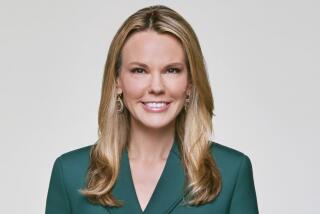KFWB and KNX: Future Allies? : Radio: If Westinghouse does end up buying CBS Inc., the company would own the two L.A. all-news stations. Some wonder if both would be maintained.
- Share via
Shortly after news broke that Westinghouse Electric Co. was negotiating to buy CBS Inc., the general manager of KFWB-AM (980), the all-news station owned by Westinghouse, ran into the general manager of KNX-AM (1070), the all-news station owned by CBS, at a bimonthly broadcasters meeting in West Hollywood.
So what did these two men who run highly successful--and competing--stations say to each other?
According to KFWB’s Chris Claus, his KNX counterpart George Nicholaw heartily greeted: “Well, it looks like we’re going to be teammates as opposed to adversaries.”
Claus said he responded: “Gonna be fun, George.”
At KNX, reporter Gail Eichenthal, visual interpreter of the O.J. Simpson trial for listeners, noted that when the takeover talk began, Victor Gold, a professor at Loyola Law School and one of KNX’s on-air legal experts, quipped off-air: “Maybe now you’re going to trade in your appliances for Westinghouse.”
Still, beneath the affability and easy humor, there is a measure of anxiety at both their houses less than a half-mile apart in Hollywood--seemingly more so at KNX, which belongs to the would-be seller, than at KFWB, attached to the would-be buyer.
Westinghouse hasn’t made a formal bid yet, but that hasn’t stopped the speculation about what might happen if it does succeed. Would the longtime rival stations be consolidated? Would there be layoffs? Would one or both of the stations be sold? And who might the next suitor for CBS be, if it isn’t Westinghouse?
KFWB’s Claus said he did not know enough to comment. “I’m not involved in the discussions corporately.” KNX’s Nicholaw was on vacation and could not be reached for comment.
KFWB reporter-anchor Steve Kindred said he thinks there’s “bound to be some consolidation.”
“Consolidation happens right and left; it’s been going on for years,” Kindred said. “But I’m confident radio listeners in Los Angeles are not going to be happy if one or the other goes off the air. . . . This has been a grave concern of mine, not as a Westinghouse employee but as a radio newsman, that the amount of news would be less and less with each merger.”
As for the more personal concern of possible layoffs, Kindred noted that that might apply to both stations, but with Westinghouse as the potential “acquisitor, I think I would be a lot more worried, very worried, if I were at KNX right now.”
An executive at KNX, who asked not to be identified, acknowledged that concern and embellished on the doomsday scenario: With a $5-billion debt incurred in the purchase, Westinghouse would be “looking for economies everywhere they turn” and might “sell off the radio properties to a third party.”
And if Westinghouse does make an offer for CBS stock “that triggers a 30-day period during which other companies can make their offers to CBS. Barry Diller with backing from Seagrams? Ted Turner? Disney? All of these big players,” the executive wonders: Are they interested in radio ?
“People are hungry,” the executive added, “for any scrap of information.”
A spokesman for Group W, Westinghouse’s broadcasting unit, declined comment, even as to whether talks with CBS are taking place, and said a question about consolidation was “not appropriate at this time.”
*
But a knowledgeable source about Group W noted that “it’s been proven that the best strategy is to bless [both stations] and let them tear each other’s hearts out. To mess with them or change their format, I believe, is ill-advised. The best strategy is [to be] competitive. Then you win no matter who wins.”
The source termed other speculation as “brain-damaged.” Group W “knows radio,” he said, pointing out it was the “first commercially licensed radio broadcaster in the world. Radio is a terrific business. The idea that [they] would divest the heart of the property is ridiculous.”
CBS has 21 radio stations; Westinghouse, 18. The two companies each have stations in eight of the nation’s top markets but only in New York, Chicago, San Francisco and Los Angeles do those stations go head-to-head with similar all-news formats.
Until the onset of the Simpson trial, KFWB tended to do a shade better in the ratings than KNX. That switched early this year. In the winter and spring Arbitron ratings, KNX drew 3.7% and 3.3%, respectively, while KFWB got 2.5% and 2.4%.
Greg Tantum, KFWB’s program director and executive editor, maintained there is “quiet confidence” that “we certainly would be players, [but] nobody really knows. We’re not told more than we read in the trades.”
Late Wednesday afternoon, the American Federation of Television and Radio Artists began circulating a memo to employees it represents at both stations, saying that the union was “carefully monitoring the situation.”
“AFTRA understands,” the memo said, “many of us may be concerned about the effects of such a transaction if it in fact comes to pass. At this point there are several unknown facts . . . including the specific structure of the transaction and whether current proposals at the FCC [Federal Communications Commission] and in Congress regarding ownership limitations are passed.”
Pamm Fair, spokeswoman for AFTRA, noted: “Basically we are watching. That’s all we can do at this point.”
Then her voice turned upbeat as she noted how everyone was saying a few weeks back that super-agent Michael Ovitz was going to take over MCA. “Nothing is a done deal,” she indicated, until it is actually done.
More to Read
The biggest entertainment stories
Get our big stories about Hollywood, film, television, music, arts, culture and more right in your inbox as soon as they publish.
You may occasionally receive promotional content from the Los Angeles Times.










